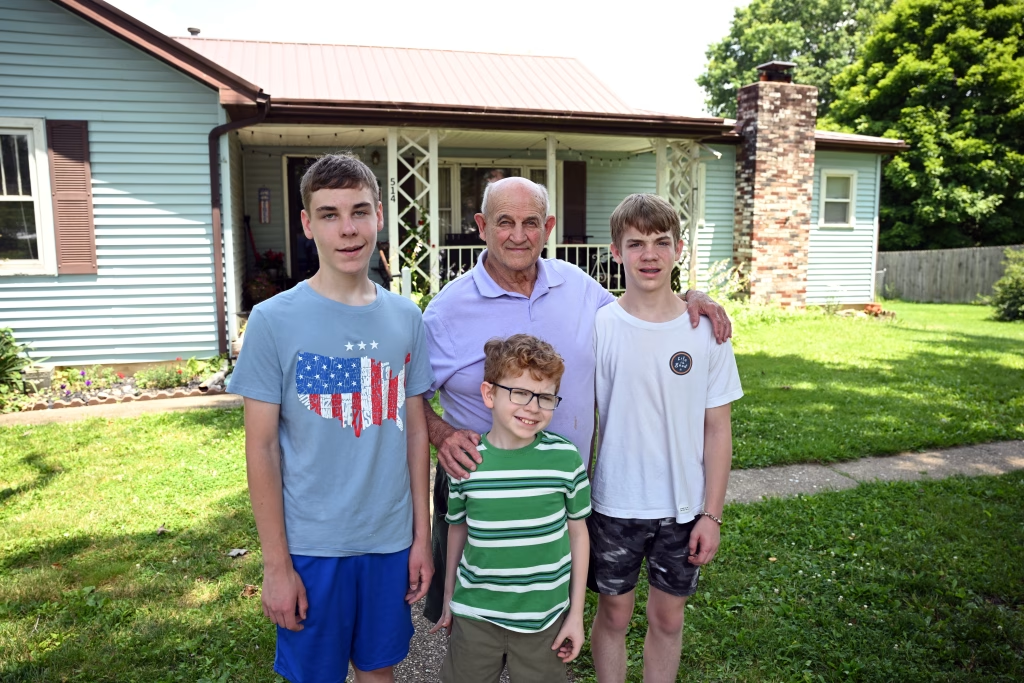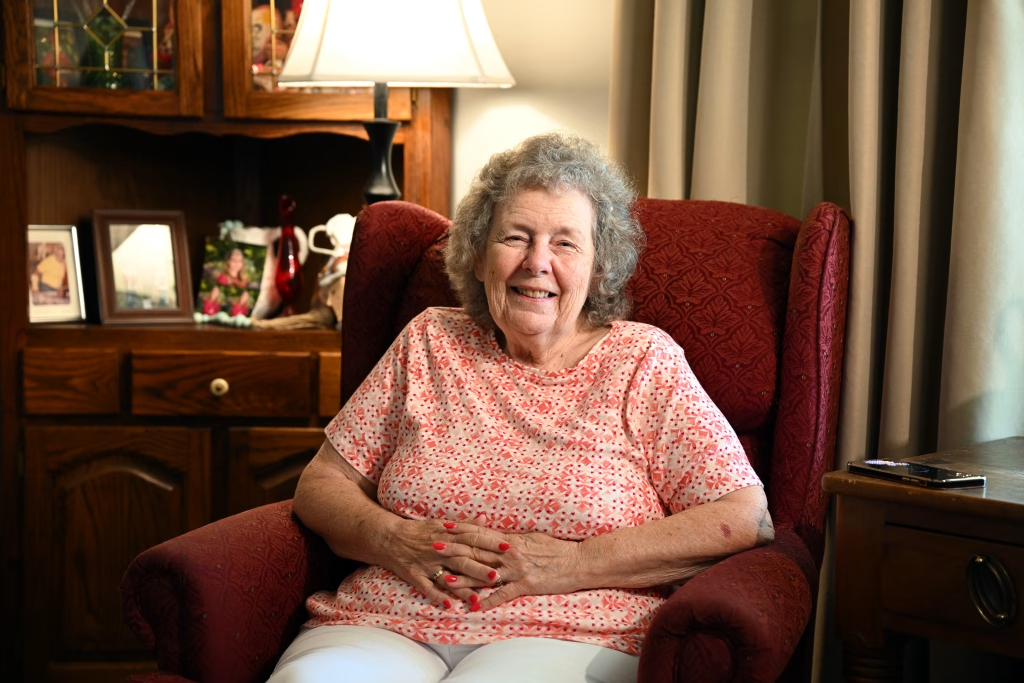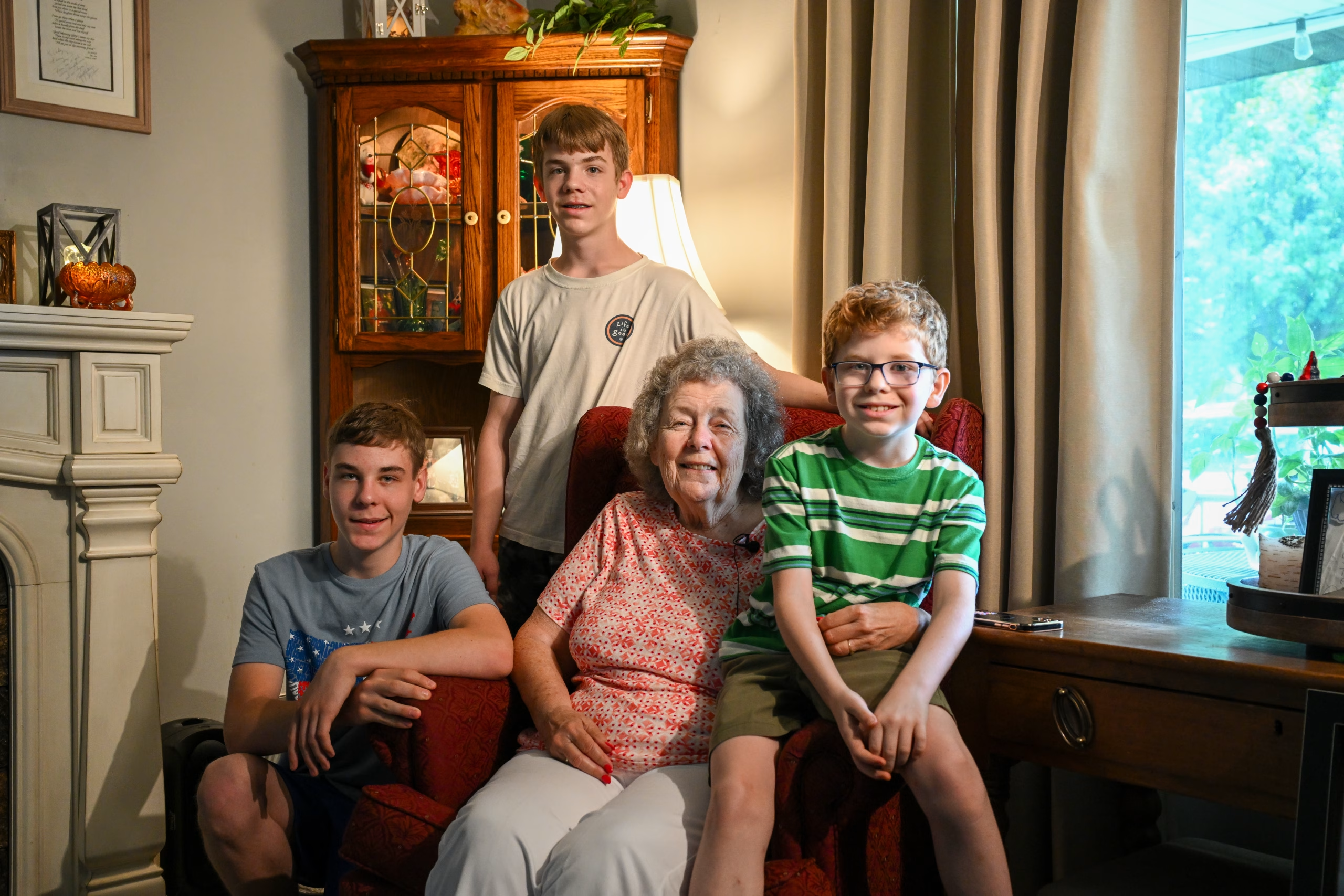Judy Wilson’s great-grandchildren, Tyler and Taylor, were stunned to learn she was not their mother.
“I told them, ‘No, I’m not your [biological] mom. I did not give birth to you,’” she says. “They were shocked, because we were the only parents they really remembered.”
The questions arose in 2017, two years after Judy and her husband, Larry, were awarded custody of the children, along with their siblings, Tucker and Tristan. Known as a grandfamily, the Wilsons’ kinship-care household is one that has become more prominent in recent years, in part because of the impact of the opioid epidemic.
According to the Grandfamilies & Kinship Support Network, as of 2024, more than 2.4 million children were being raised in kinship/grandfamilies in the United States. A 2023 report from Generations United stated that 6% of West Virginia children were living in grandfamily households. Only New Mexico and Mississippi ranked higher.
As grandparents adjust to once again being parents, they often need support, from education and resources to simple human interaction with people in similar situations. The Wilsons found support in Healthy Grandfamilies, a free program offered by West Virginia State University (WVSU) Extension Service that provides information and resources to grandparents – or, as in the Wilsons’ case, great-grandparents – who are raising their grandchildren.
The program launched as a pilot in and around the Kanawha Valley in 2015 and has since expanded statewide. It is structured as a series of interactive educational sessions.
“Throughout the sessions, grandparents are provided support and information on the availability of and how to access resources that can help meet their needs,” says Hanna Thurman, interim director for WVSU’s Center for Healthy Grandfamilies. “Follow-up support and social work services are also provided and vary depending on the needs of the grandfamily.”
‘We’re changing diapers again, and here we are in our sixties.’
Before moving in with Judy and Larry, the kids had been in foster care for two years and were back in the home with their biological parents when Judy received a call late one Sunday night.
“The Charleston Police Department called me and asked if I would come pick them up, which I did,” says Judy. “I then went to the courthouse and filed for custody.”
That was 10 years ago. Tucker, the oldest, was five; Tristan, the youngest, was 14 months old. At a time when they were planning the next phase in their retirement, Judy and Larry suddenly found themselves parenting young children.
“We’re changing diapers again, and here we are in our sixties,” Judy says of that time. “We’re starting this all over again.”
Starting over was something the Wilsons knew a lot about. The couple met at the local Moose Lodge nearly 50 years ago after each had ended previous marriages. Larry asked Judy out the first time they met. She initially said no.
“I would not go out. I wasn’t seeing anyone,” she says. “I didn’t want to.”
Five months later, he asked again. That time, she said yes. They’ve been together ever since.
Judy worked for the power company, and Larry was a truck driver before opening what Judy lovingly calls “the junk store,” where he sold furniture, antiques and various other items. Between them they had six children, including two from Larry’s previous marriage.
Their children are now grown, many with children and grandchildren of their own.
‘We were planning on a different lifestyle’
After raising their children, Judy and Larry were in the process of a considerable downsize when the kids came into their custody. They had sold their house, furniture, car and many of their belongings and were planning to move into a senior living community.
“We had plans to travel and do different things,” Judy recalls. “Then when this happened, it was we have to buy furniture again. We have to have two cribs, two twin beds. We needed high chairs and car seats, and we didn’t have a van any longer. So, basically, we started all over again. We were planning on a different lifestyle. That part of it was hard.”
Despite the hardship of suddenly setting up a household as a grandfamily, the decision to raise the kids was an easy one.
“There wasn’t time to talk about it. Either we were doing this, or we weren’t. It was a big adjustment for everybody, but that didn’t take long.”
The Wilsons’ situation, Thurman notes, is not uncommon.
“Grandfamilies are busy doing the best they can to provide a good, stable home,” she says. “However, they face challenges many other families do not. Sometimes they become caregivers with little or no notice, and it is an entirely different role than they may have bargained for or planned.”
As Judy and Larry adjusted to being a grandfamily, they immediately realized that it was vital to provide structure while also creating happy memories.
“There’s trauma involved anytime a child goes through any kind of change, so we try to keep it as structured as possible,” Judy says. “You get up, you make your bed, you do your chores. We try to keep meals at the same time, maintain the same bedtimes. As they get older, that’s more difficult, but it helps.
“We’ve also always tried to do day trips, like take them to the zoo. And we wanted to see their faces when they saw the ocean for the first time, so it was on our bucket list to take them to the beach, which we eventually did. It was awesome. They loved it.”
Judy admits, however, that raising children today is much different than when she and Larry did it decades ago.
“Peer pressure is totally different with kids today than it was when my kids were growing up. Back then, you could turn kids loose. If you were in by dark, you were good to go. We knew all the neighbors. It’s not like that anymore. Now, they can go down to the stop sign on their bikes, then they have to turn around and come back.”
The Wilsons have also had to educate themselves on a condition they weren’t expecting to become a daily part of life. Two of the kids deal with issues stemming from Fetal Alcohol Syndrome, a condition in a child that results from alcohol exposure during the mother’s pregnancy.

‘It’s a daily challenge’
According to the Mayo Clinic, consuming alcohol during pregnancy can cause children to have disabilities related to behavior, learning, thinking and physical development. Symptoms vary but are lifelong.
“Each child is different,” says Judy. “They might be destructive, have anger issues, they might have problems with memory. Even though we have two with it, they’re two totally different scenarios as to how they might react in a situation. It’s the biggest challenge that we’ve faced, and it’s a daily challenge, because you don’t know from one day to the next what they’re going to do.”
Judy learned quickly that the more information she had, the better.
“We’re still learning. It can be very difficult to understand.”
That’s where support programs like Healthy Grandfamilies play an important role. The program recently piloted a new curriculum called Caring for Our Kin, developed in collaboration with Penn State and West Virginia University Extension. Sessions focus on topics like child development and behavior, healthy lifestyles, family communication, and navigating situations such as parental substance use and addiction, technology and social media, and the school and legal systems.
In addition to the educational component, the program also provides a much-needed opportunity for participants to meet and bond with others in similar situations.
“There’s so much involved in taking care of grandchildren and, in our case, great-grandchildren,” Judy says. “You need support. You need help. The Healthy Grandfamilies program has been a godsend.”
The Wilsons completed the program in 2024. After the initial series ends, however, program staff remain in contact with participants to continue providing support and resources, often adapting the support to specific family needs.
“Some grandparents in our program are younger while others are in their nineties,” Thurman says. “Imagine trying to keep up with young children in your seventies or eighties while you try to deal with your own health issues. Some grandparents are employed outside the home, others struggle with basic needs like transportation and food. The challenges can be immense.”
Among the ways the program provides ongoing support is through the operation of a food pantry that supplies grandfamilies with canned and dry goods. WVSU Extension Service also operates a produce market near campus that is providing vouchers to program participants to receive fresh, locally grown vegetables during the summer months.

‘They’re yours, and that’s it’
After a decade living with the Wilsons, the kids are aging into their teen years, which brings new challenges but also glimpses into whom they might become as adults. Judy, who will turn 79 this fall, has a simple wish for the family.
“My biggest hope is to live long enough and stay healthy enough to get them through school and see that they are set up for a life where they can be independent and take care of themselves.”
And the kids are doing well. Tucker, now 15, takes early enrollment college courses while Tristan, 11, completed the necessary fifth grade requirements in the fourth grade and will enter sixth grade in the fall. The family also participates in the Children with Serious Emotional Disorders Waiver program, which allows children with disorders to receive additional services. Therapists visit the home weekly to work with the boys who need extra support.
“The therapists they’ve worked with go above and beyond,” Judy says.
Judy also acknowledges that she and Larry need their own kind of support – emotionally and physically.
“As a grandparent, and great-grandparent especially, there’s so much you can’t do that you could do when you were younger. Physically, your body just won’t let you do so many things that you would like to do.”
Healthy Grandfamilies builds self-care information into the program so that caregivers remember to address their own physical and mental health – something that can be a struggle in a busy, crowded house.
“Sometimes just being in the same room with other grandparents who face similar challenges means a great deal,” Thurman says. “Grandparents’ mental health can improve, even if just a little, because they feel a little more supported, less isolated and more heard. Grandparents often do not have much time for self-care, but we tell them that coming to the education sessions and talking to other grandparents is self-care.”
“It’s very hard to find any ‘me’ time,” adds Judy. “You just work it in whenever you can.”
That includes finding time to nurture her own relationship with Larry. The couple recently went on their first vacation alone.
“My daughter watched the kids, and we went to Virginia Beach for four days. That was the first time in all the years we’ve had them that we had been away like that.”
They enjoyed themselves, but something was missing.
“It was nice, but we missed the kids. When they’re not there, there’s a hole,” she admits. “What can I say? When you’ve had them as long as we’ve had them, they’re yours, and that’s it.”
As the kids continue to grow and develop, Healthy Grandfamilies will remain a source of support and resources for the Wilsons as long as they’re needed.
‘The program is still so needed’
A decade into its existence, Healthy Grandfamilies continues to expand and find new ways to reach its audience. With annual funding from the State of West Virginia, and additional funding from sources such as the USDA National Institute of Food and Agriculture and the Greater Kanawha Valley Foundation, the program is now offered through a network of county coordinators and coalitions who conduct the sessions statewide.
To date, Thurman estimates that the program has reached more than 3,500 people.
“That is a conservative estimate,” she says. “Families only share information that they are comfortable sharing and, for various, justified reasons, we find some grandfamilies prefer to keep a low profile.”
Regardless of the exact number of families reached, Thurman is pleased with the impact Healthy Grandfamilies is having across the state. This summer, the program will host its fourth annual statewide Healthy Grandfamilies conference and will soon establish its first-ever joint faculty and Extension appointment with the WVSU Department of Social Work.
While the program is proving successful, Thurman is well aware that there is much work to do.
“Supporting grandparents and other kinship caregivers is going to continue to take all the support our communities can muster,” she says.
Thurman began working with Healthy Grandfamilies last year and continues to be inspired by the resilience and strength of program participants.
“I am just so genuinely touched by how grateful the grandparents are to be a part of the program despite the immense challenges they face,” she says. “I’m amazed that they can make time to attend our education sessions given the physical and emotional strain and the demands they shoulder because their grandkids need them. In part, it may be because the program is still so needed.”
Judy and Larry are testaments to the kind of resilience Thurman and the statewide program facilitators see every day.
“No matter how old you are, I guess you just struggle through the best way you can, you know?” says Judy. “I have to thank God that we’ve been able to do what we have for them. I hope that we’ve done our best.”
Learn more about WVSU Healthy Grandfamilies at wvstateu.edu/healthygrandfamilies.
